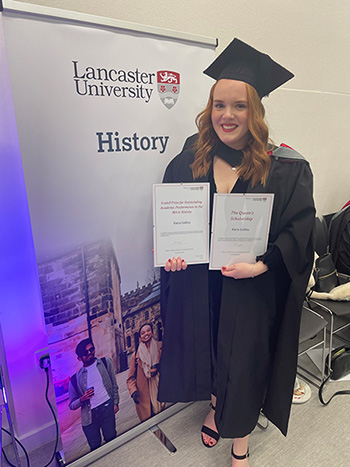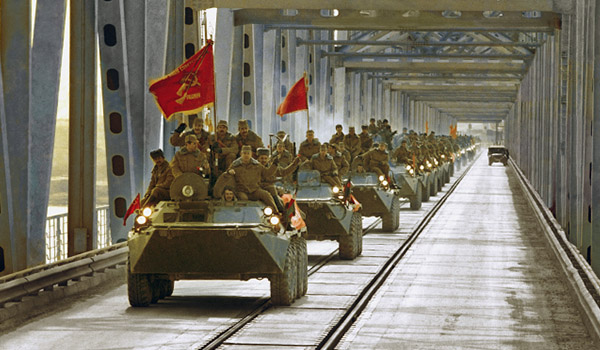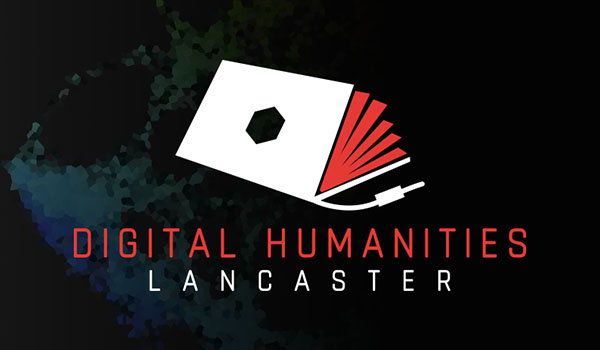
Studentships and Essay Prizes
We award a number of prizes and studentships at undergraduate, Master's and Doctoral levels throughout the year. These include prizes for academic performance as well as special essay prizes, such as The Merriman Essay Prize and the Lancaster Prize in Digital Humanities.

Undergraduate Essay Prizes
Andrew Pearson Prize
The Andrew Pearson Prize was set up in memory of Andrew Pearson, a student of History (1985–1988) who was tragically killed in an accident when on holiday in New Zealand. The award is for the single major History student who, in the opinion of the Part II board of examiners, has written the best dissertation.
WINNER 2024: Ash Kreit for his dissertation, 'Eighteenth-Century Scottish Newspaper Advertisements and the Construction of a System of Slavery'
Queen's Scholarships
Regulations for the Queen's Scholarships are available in the Department of History. Awards are made by the Senate on the recommendations of the Head of Department to the undergraduate who has done best in Part I and intends reading History as a major or combined major course (scholarship first awarded in 1966) and to the undergraduate reading history as a major or combined major course who has done best in second-year studies.
WINNER 2024: TBC
A. H. Woolrych Prize
The prize, instituted as a result of the commemorative appeal made on the retirement of the late Professor A H Woolrych, the founding professor of the Department of History, is an annual book prize awarded to the undergraduate who during the academic year presents the best essay in a Part II History course. The prize was first awarded in 1987.
WINNER 2024: Maja Hanrahan for her HIST263: Disabling the Body? Op-ed assignment, '"Is it even possible?" Sex, Agency, and Disability in BBC's Call the Midwife'
Eric J. Evans Prize
The Eric J. Evans Prize recognises the Best Undergraduate Dissertation in Social and Political History.
WINNER 2024: Rowan Higgins for their dissertation, ‘“They'll March with their Brothers to Freedom": The Nationalism of Working-Class Women in the Irish Revolutionary Period, 1916–1923’
Previous scholarship and essay prize winners
Previous scholarship and essay prize winners are detailed below:
accordion
Lewis Hughes Prize - Philippa Lazarus (Ancient and Medieval), Emily Brooks (Early Modern), and Joseph Lee (Modern)
Andrew Pearson Prize - Eleanor Charlotte Hughes and Holly Rebecca Jones.
Queen's Scholarships - Matthew Staton (Part I), Laura Kate Nutter (Part II) and Thomas Roberts (Part II).
A H Woolrych Prize - Natasha Jane Robinson.
Andrew Pearson Prize - James Lockwood and Georgia Megan Britton.
Queen's Scholarships - Anna Drury, Phoebe Mia Kendrew and Holly Parsons (Part I). Jennifer Kehlenbeck, Gergana Tsvetanova, Molly Lawson and Grace Olivia Sewell (Part II).
A H Woolrych Prize - James Andrew Clarke, Ignas Gulbinas, Georgia Megan Britton, Conor Walker and Georgia Whelan.
Andrew Pearson Prize - Dabeoc Stanley, Caroline Winstanley and Caitlin Cheshire.
Queen's Scholarships - David Comerford, Louise Varley, Eve Hood, Jude Rowley, Sofia Skiming, Bridget Morgan and Kiera Collins.
A H Woolrych Prize - Dabeoc Stanley.
Winner - Adam Stanney, Lancaster University,for his essay ‘Why did Muslim political power in the Western Mediterranean fragment in the first half of the 1000s?. His essay adopted an international approach to assessing the political decline of the medieval powers of Kalbid Sicily and Umayyad Spain.
The judging panel – Professor Michael Hughes, Professor Marco Wyss and Dr Sarah White – praised the essay's engagement with a wide range of secondary sources and its' skilful use of translated Arabic primary sources to provide an alternative perspective. They felt that the essay constituted a clear contribution to the scholarship and provided a fresh perspective on Muslim power in the Western Mediterranean in the first half of the 1000s.
Adam Stanney responded: "I am very happy to have received this year’s Merriman Prize. Writing the essay was a great experience and the medieval Islamic topic was far from anything I’d properly studied before. Drawing research away from what was familiar certainly proved a fulfilling exercise, developing my understanding of the medieval world on a more global scale. Moreover, the geographically and thematically comparative element to the piece kept things fresh when reading and tested my overall argument more so than a regular essay question. I would like to sincerely thank the panel for the award, and the Department of History at Lancaster University for providing an enriching academic environment."
The 2021-22 runner up was Daniel McCue, University of Glasgow, with his essay 'To what extent did the psychology of the Athenian hoplite in Classical Greece
while in a state of violence conform to the psychology of the modern infantryman?'.
Winner - Cadet Daniel Berardino, United States Military Academy (West Point), for his essay ‘Revolution or Evolution? A Quantitative Analysis of the Impact of Artillery on Sieges in the Hundred Years War’.
Honorary Mention - Sterling Mancuso, University of Toronto, for his essay ‘Expulsion Compulsion: Reconsidering the Motivations and Consequences of the 1923 Turco-Greek Population Exchange’.
Winner - James McHale, Huddersfield University, for his essay ‘“Saladin’s delaying tactics gave the Crusaders little choice” – Jonathan Phillips. Is this a valid conclusion to draw about the massacre of the Muslim prisoners at Acre?’.
Winner - Naja Algreen Suhr from the University of Copenhagen for an essay on “The elderly of Copenhagen in 1885.”
Highly Commended - Two other applicants, Kanish Garg (Indian Institute of Technology, Roorkee) and Lena Zlock (Stanford University) were noted as highly commended.



.jpeg)
